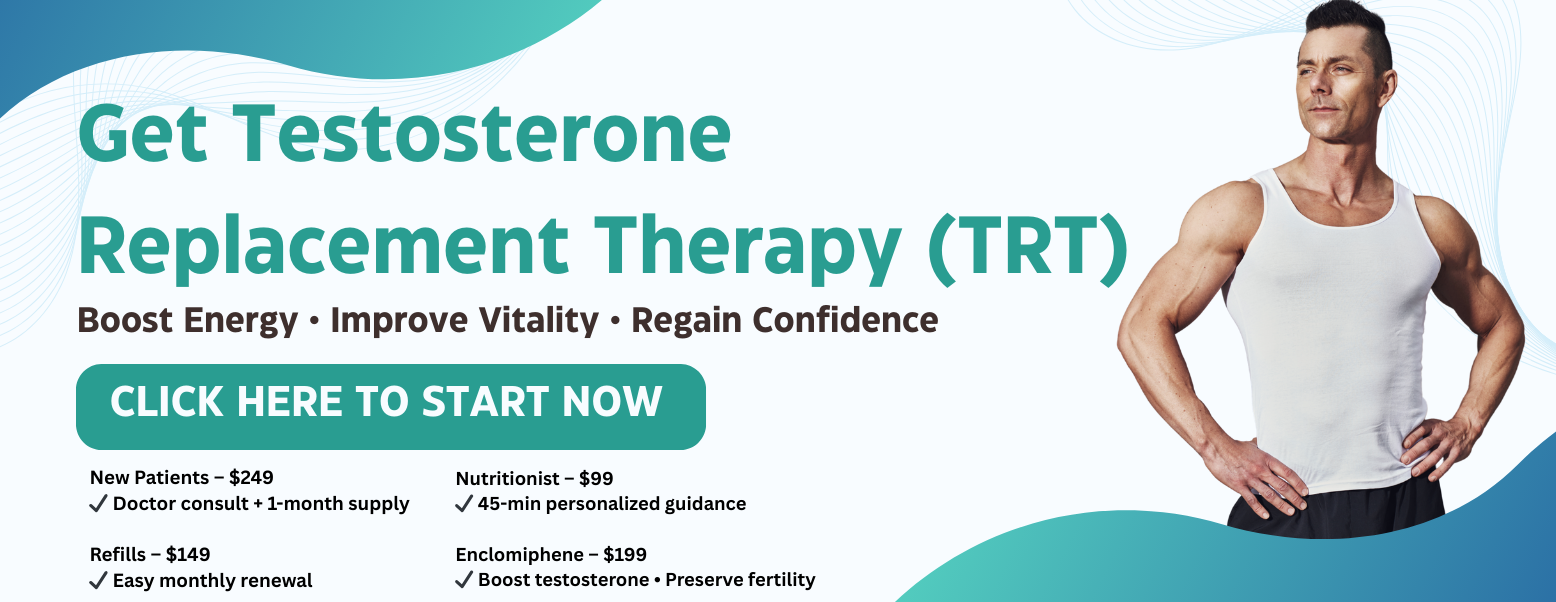Testosterone Replacement Therapy (TRT) can provide an incredible overall change in men suffering from low testosterone- increased strength, endurance, mood, and libido. But there is one side effect that many do not recognize is coming. Testicular atrophy. In simpler terms, your testicles might shrink while you are on TRT. This can cause concern for men that are interested in fertility, self-image, or natural production of testosterone in their bodies.
Don’t Wait, Reclaim Your Vitality – Click here to Book Your TRT Consultation Now!
The good news: Testicular atrophy is not inevitable- it can be prevented and often reversed with proper planning. In this 2025 guide we will examine what causes testicular atrophy and how clinics like The KIF can allow you to remain in control of your hormones, health, and self-esteem.
What Causes Testicular Atrophy on TRT?
The main cause of testicular atrophy on TRT is a disruption to your body's natural hormonal signaling. When testosterone is introduced externally, the body turns down its own production of hormones- the testes no longer receive the signals needed to keep them active.
-
Suppression of LH and FSH Production
TRT sends signals to the brain that enough testosterone is already in place, so the brain will lessen the LH and FSH stimulation hormones. Without these hormones, the testes will Hibernate mode which will lead to shrinkage.
-
Long-Term Exogenous Testosterone Use
Long term use of TRT without use of corresponding medication may lead to depletion of natural testosterone production. When the testes are not being stimulated for months, even years, the testes will lose volume and function.
-
Delivery Method and Dosage
It matters how you take it. Faster acting injections can spike levels of testosterone immediately & more suppress naturally occurring hormones. Delivery methods that are low & more stable - patches, gels, for example - may attenuate the stimulus for testicular shrinkage.
-
Estrogen Conversion from Testosterone
Some testosterone can lead to conversion of some to estrogen through aromatization. Ultimately, if it gets too high, it will affect feedback loops and lead to additional testicular shrinkage unless it is managed properly respectively.
-
Individual Genetics and Sensitivity
Everyone's hormone system is individual. Genetics, sensitivity and being at their baseline endocrine health whenever testicular atrophy happens is completely individual, which is the importance of a customized TRT protocol.
Top Strategies to Prevent & Reverse Testicular Shrinkage
The good news is you do not have to decide to either feel great, or consider preserving testicular health. By using some targeted therapies and smart hormone switching techniques men can keep their testes still alive and working despite being on TRT.
-
Use of HCG (Human Chorionic Gonadotropin)
HCG mimics LH in a way it stimulates the testes to continue producing testosterone and sperm. Adding HCG to TRT keeps your testicles at their size and keeps you fertile. A typical dose is 250-500 IU 2-3 times weekly, typically used together with your TRT.
-
Clomiphene Citrate (Clomid)
Clomid helps trigger your brain to release more LH and FSH naturally. Clomid is a great option for those men who would like to protect sperm production alongside trying to signal natural hormone signalling the best they can while receiving TRT.
-
Try Pulsed or Low-Dose TRT Cycles
While some protocols substitute consistent and high-dose testosterone with cycles of TRT or use of minimal doses to intermittently allow the pituitary recovery, it's a much more dynamic way of offering less long-term suppression, and isn't for everyone.
-
Combination Therapy: TRT + HCG
If you start HCG at the same time as TRT on day one, you can prevent inactive testes in the first place. This combination therapy is commonly recommended for men that care about testicular size or want to father children.
-
Avoid Unmonitored Anabolic Steroids
Taking unmonitored anabolic steroids, even at lower doses, will ruin your internal hormonal profile. These substances cause a remarkable suppression of the HPG axis, and can lead to prolonged or even permanent testicular atrophy.
-
Post-Cycle Therapy (PCT) When Stopping TRT
If you're coming off of TRT, it's essential to make a proper Post Cycle Therapy (PCT) to follow up. You may use medications such as Clomid and HCG to stimulate your own hormone production, and restore testicular size/function and sperm function.
Top Lifestyle & Nutritional Strategies to Improve Testicular Health
Aside from medications, your daily lifestyle can influence testicular function. Factors such as nutrient intake, stress management, and overall health are important components of stimulus in how your testes respond to TRT.
Consume Zinc-Rich Foods
Zinc works with your body in the synthesis of hormones and sperm. Eating zinc rich foods (like shellfish, eggs, nuts, and red-meat) will protect your testicles and boost testosterone production.
Prioritize Sleep and Recovery
The majority of hormones are released by your body during deep sleep (when hormone levels are at healthy levels). If you reside in poor sleep, the effectiveness of TRT will likely be diminished, and your body's natural cycle cannot function normally. Try to achieve 7–9 hours per night of quality sleep.
Maintain a Healthy Weight
Fat cells metabolically convert testosterone into estrogen. Being overweight increases the process of converting testosterone to estrogen and creates a more hostile hormonal environment leading to rapid atrophy. Staying lean will serve your hormonal health, and support your testes to function at a high level.
Reduce Exposure to Endocrine Disruptors
Chemicals associated with plastics, cans, and even some cleaners will be endocrine disruptors that can interfere with normal endocrine function. Lowering your exposure will assist in supporting natural testicular function, and limit any external hormonal interference.
Include Healthy Fats in Diet
Testosterone derived from cholesterol, which means dietary fat intake is critical. You will also want to eat healthy fats from avocado, fatty fish, nuts and olive oil--none of the processed or trans fats that will undermine the balance of your hormones.
Avoid Excessive Alcohol and Recreational Drugs
Alcohol and cannabis are part of the conversation here--they can both suppress testosterone production and affect the local environment in the testis. Minimize these substances to maintain proper function of your HPG axis, and the production of testosterone.
How to Monitor Testicular Health on TRT?
The practice of avoiding testicular atrophy is not a set it, and forget practice. Monitoring is critical to ensure your testes stay healthy and you are adjusting your hormonal protocol as needed in relation to changes in your body.
Regular Testicular Self-Exams
Take charge of your own health. Develop the habit of checking your testicles for changes in size, firmness or tenderness. If anything does not feel normal, discuss with your healthcare provider in a timely manner.
Track LH and FSH Blood Levels
Low LH and FSH levels in your system indicate that your own hormone production has been suppressed. If these levels are low, you may need to explore support therapies including HCG to prevent ultimate shutdown of your testes.
Monitor Semen Analysis for Fertility
Are you and your partner working on having kids? If so, it is imperative that you are tested regularly for your semen analysis. Testing will provide sperm count and motility, allowing you to follow fertility tracking and know if you need to adapt treatment or change your plan.
Ultrasound for Testicular Size (When Necessary)
An ultrasound will give you more information about testicle size and volume in addition to blood flow and tissue health. It can help identify the need for further evaluation, as necessary, due to pain, overt asymmetry or significant shrinkage.
Routine Checkups with a TRT Specialist
When you work with specialists, like those at The KIF, you will receive expert guidance on what your options are, routine lab work, and adaptations of treatments in a timely manner that protects your health and performance.
Keep a Journal of Symptoms and Physical Changes
Noticing less volume of semen, decreased libido, or tightness in your scrotum? Record all of these symptoms. It can often identify patterns that will identify your body's changing response and provide information for your provider to help adapt your protocol.
When to Seek Specialist Help?
Some situations may require additional support. You may need to consider bringing in a hormone or fertility specialist if your testicular health declines or you are not responding well to the conventional therapies.
-
Signs of Severe Testicular Atrophy
Significant shrinkage, tenderness, or loss of firmness should prompt professional review, as these may be signs of underlying conditions or deep suppression.
-
Difficulty Achieving or Maintaining Erections
While TRT usually facilitates improved libido and sexual performance, if testicular atrophy has occurred during the process, then this can be a factor working against you. If your sexual function is declining, now is the time to reflect on the balance of your hormones.
-
No Improvement with HCG or Clomid
If you have invested in supportive medications to improve testicular size without firmer results, then there may need to be an investigation deeper on hormonal concerns. The response may be halted by pituitary dysfunction or due to some issue with how receptors are working in the tissue or the body.
-
Infertility Despite Preservation Efforts
The semen analysis shows you have little opportunity for improvement, in the case you need to consider advanced fertility options, including testicular sperm extraction. You may need to begin the transition to a reproductive endocrinologist to help you evaluate new alternatives.
-
Developing Other Hormonal Symptoms
Breast tenderness, fatigue, irritability, or fat gain may be signs of larger hormone issues. Any of these contributing to worsening testicular health, in my opinion, warrant action and should not wait.
-
Switching from Non-Medical TRT or Steroid Use
Are you starting TRT through unregulated means? It is important that you reformulate your approach to a medically monitored process. Clinics like The KIF provide a safe, legal and monitored program centered around your biology.
Conclusion
Testicular atrophy may seem like a painful roadblock, but with the right tools and measures, it does not have to be. Men using medications such as HCG or Clomid, smart TRT protocols and lifestyle interventions can protect both vitality and reproductive health.
At The KIF, we understand how important it is to feel well while protecting what is most important. That is why we offer:
- Free Consultation ($0) so you can start your TRT path with confidence.
- New TRT Patient Program ($249) consisting of a full telehealth eval + 1-month treatment.
- Monthly TRT Subscription with ongoing physician support.
- TRT Refills ($149/month) so you can receive medically guided services conveniently.
Do not choose between energy and fertility- you can have both.
Book your free consultation with The KIF today and start reconciling your life.
 Since 2021, Kif offers a streamlined platform to get a medical marijuana card online. We have served more than 45K patients across the United States. Sign Up Now to get the right to use medical cannabis for your health condition without any delay.
Since 2021, Kif offers a streamlined platform to get a medical marijuana card online. We have served more than 45K patients across the United States. Sign Up Now to get the right to use medical cannabis for your health condition without any delay.
























